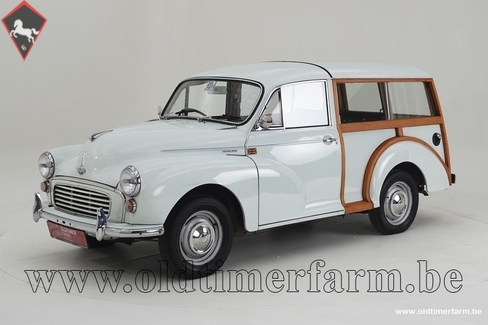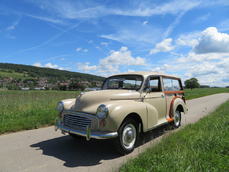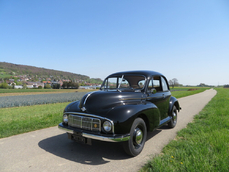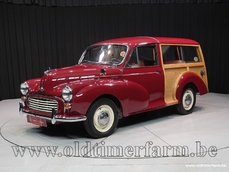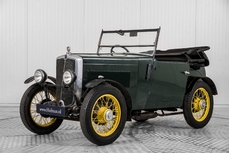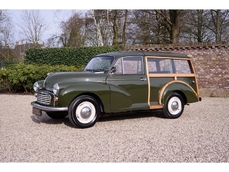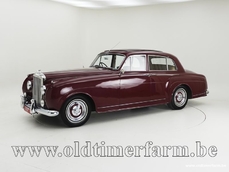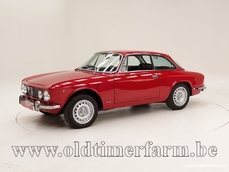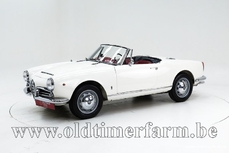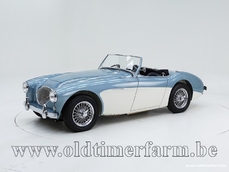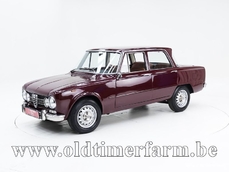Morris Minor 1000 Woody '71 1971
General description :
Often called the ‘British Beetle’ Spacious though cute old-timer Belgian MOT, British maintenance bills The Morris Minor was built in a first series from 1928 to 1934 and had a significantly longer heyday from 1948 to 1971. Throughout the second period of 28 years of production, the car was built by three different car manufacturers, which also adds British automotive history to the Minor. The Morris Minor is often compared to the Mini, the Fiat 500, the Citroën 2CV, and the Renault R4. Also, it is sometimes referred to as the 'British Beetle’. Sir Alec Issigonis is the man behind the Morris Minor, which was introduced in 1948. The same man that designed the famous Mini a decade later. The Mini was initially even advertised as the 'Mini Minor' and was considered the successor to the Morris Minor. Despite the introduction of the Mini in 1959, the Minor remained in production for about twelve more years. Alec Issigonis’ plan for the Minor was to design a budget-friendly car that would match the quality of a higher-end car. Additionally, he was keen on turning customers into true Minor ambassadors; he wanted Minor owners to be proud of the car they were driving and managed to transform his budget-friendly cars into status symbols. The design is adorable and almost endearing. Under the hood, there is an extension of that design. The Minor was equipped with a side-valve four-cylinder engine, but in the early 1950s, this rather outdated engine was replaced by a more modern straight-four engine. Over 1.6 million Minors were built. Various variants came on the market - you truly have Minors in all shapes and colours - and the Minor underwent extensive updates and modifications over the years to meet market demands. The initial design remained recognizable, making it iconic. Morris Traveller ('Woody') As mentioned before, several variants were designed and conceived for the Minor, and the Traveller is one of them. The Traveller was introduced in 1953 and is an avant-garde estate car. The long and spacious rear end is finished with ash wood, therefore the Traveller was nicknamed 'Woody.' Approximately 200,000 Woody Minors were built. It is a fun and spacious classic car that can be used as a ‘workhorse’ as well as for leisure rides. Also, finding replacement parts is not a problem as Woodies were produced in large quantities for up to thirty years after the end of the Traveller’s production run. Technical information: Body work Length (cm): 376 (148 inch) Width (cm): 155 (61 inch) Height (cm): 152 (60 inch) Wheelbase (cm): 218 (86 inch) Weight (kg): 762 (1680 lbs) Mechanics Engine: 1098 cc straight-six front-engine Valve gear: 8 Fuel system: 1 SU carburettor Gear box: 4-speed manual Transmission: RWD Right-steered power: 49 hp (36 kW) at 5100 t/m torque: 81 Nm at 2500 t/m Top speed: 117 km/h (73 mph)
1971 Morris Minor 1000 Woody '71 is listed for sale on ClassicDigest in Aalter by Oldtimerfarm for €11950.
Car Facts
Car type : Car Make : Morris Model : Minor Model Version : 1000 Woody '71 Engine size : 0.0 Model Year : 1971 Location : Aalter Vehicle Registration : Undefined
11950 €
People who viewed this Morris Minor also viewed similar Morris listed at ClassicDigest
Other cars listed for sale by this dealer
About Morris
The history of Morris Motors spans several decades and includes the production of various iconic models that left a significant mark on the automotive industry in Britain. From its inception to its eventual integration into the British Leyland Motor Corporation (BLMC), Morris played a crucial role in shaping the everyday motoring experiences of countless Britons.Founding Years (1912-1920s): William Morris established Morris Motors Limited in 1912. The company initially produced affordable vehicles, including the Morris Oxford and Morris Cowley, which were known for their reliability and became popular choices among the working class.
Interwar Period (1930s): The 1930s saw Morris introducing significant models like the Morris Eight, a small car that became widely popular due to its affordability, reliability, and ease of use. The Morris Ten also gained attention during this era.
Post-World War II (1940s-1950s): After World War II, Morris introduced models like the Morris Minor in 1948. The Minor was a revolutionary small car with modern features, spacious interiors, and became a British motoring icon.
Expansion and Merger (1960s): During the 1960s, Morris was part of a series of mergers that formed the British Motor Corporation (BMC). Models like the Morris Mini, launched in 1959, became an international sensation and an emblem of British design and engineering.
British Leyland Era (1970s): In 1968, BMC merged with Leyland Motors to form British Leyland Motor Corporation (BLMC). Morris continued to produce several models during this period, but the brand began to lose its individual identity within the larger conglomerate.
Important Morris Models:
Morris Oxford (1913)
Morris Cowley (1915)
Morris Eight (1935)
Morris Ten (1933)
Morris Minor (1948)
Morris Mini (1959)
Morris Marina (1971)
Morris Ital (1980)
Throughout its history, Morris produced cars that catered to the needs of the average Briton. Their vehicles were known for being reliable, practical, and often affordable, making them a common sight on British roads for many years.
However, by the late 1970s and early 1980s, British Leyland faced financial difficulties and issues with quality control, leading to a decline in the reputation of Morris and other brands under its umbrella. The Morris brand eventually phased out with the reorganization of British Leyland, as the company shifted focus and streamlined its product lines.
Despite its eventual decline, Morris played a vital role in shaping the motoring landscape in Britain and left a legacy with several models that became ingrained in the memories of generations of British motorists.
